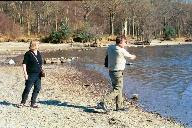A white Lamborghini of breathtakingly futuristic design is parked in Queensway, not very near the curb and more or less impeding traffic. Licence plates not UK but not diplomatic either. Arabic numbers on top and regular ones underneath. Easier to understand the sense of entitlement with a car like that than to fathom why the owner was oblivious to possible damage to his own vehicle so imprudently positioned.
A brief visit to the British Library. Spend a little time with the Magna Carta exhibition. There.s also a small display of children's book illustrations. Actually, I'm most taken with a little book in the shop featuring quirky places to see in London, but unwilling to spend £11 ($18.35 CAD) adding a non-electronic book to my suitcase.
Supper at the little cafe at the Mary Ward Centre, an adult education facility. It's an easy walk from the British Library but a bit awkward to find, hidden behind Clerkenwell Road. A lovely little find, though. Gourmet quality vegetarian food at student prices. J has a lentil and vegetable stew and I celeriac and mushroom pie with rice and cheese topping. We share a green salad. Delicious.
Our final stop is at the London School of Economics for a lecture (passing on the way our second interesting car of the day, a GWiz electric at a free charging point - electric cars are also exempt from the daily congestion charge for driving in central London).
The speaker is Roberto Mangabeira Unger, Professor at Harvard and former minister in the da Silva government in Brasil. The event is being broadcast for BBC Radio 4, and it's very interesting. Unger's vision is of a society that moves beyond the "poisonous" confines of economic nationalism: It's intolerable that we should embrace globalisation where goods and money are free to move but people are imprisoned within the nation state. He sees a world in which each adult is responsible not only for a productive job but for caring for someone outside his or her own family and insists that this is not an impractical utopian ideal but a way of life that would be embraced for the deep satisfaction it provides. The proposals, he says, don't depend on the view that we can radically change ourselves. We want ordinary activity gradually to expand. For example, suicide dropped during WW II and rose afterward because people were engaged in something bigger than themselves. We want that enlargement not only in crisis: nobody who has tasted a larger life will want to abandon it.






